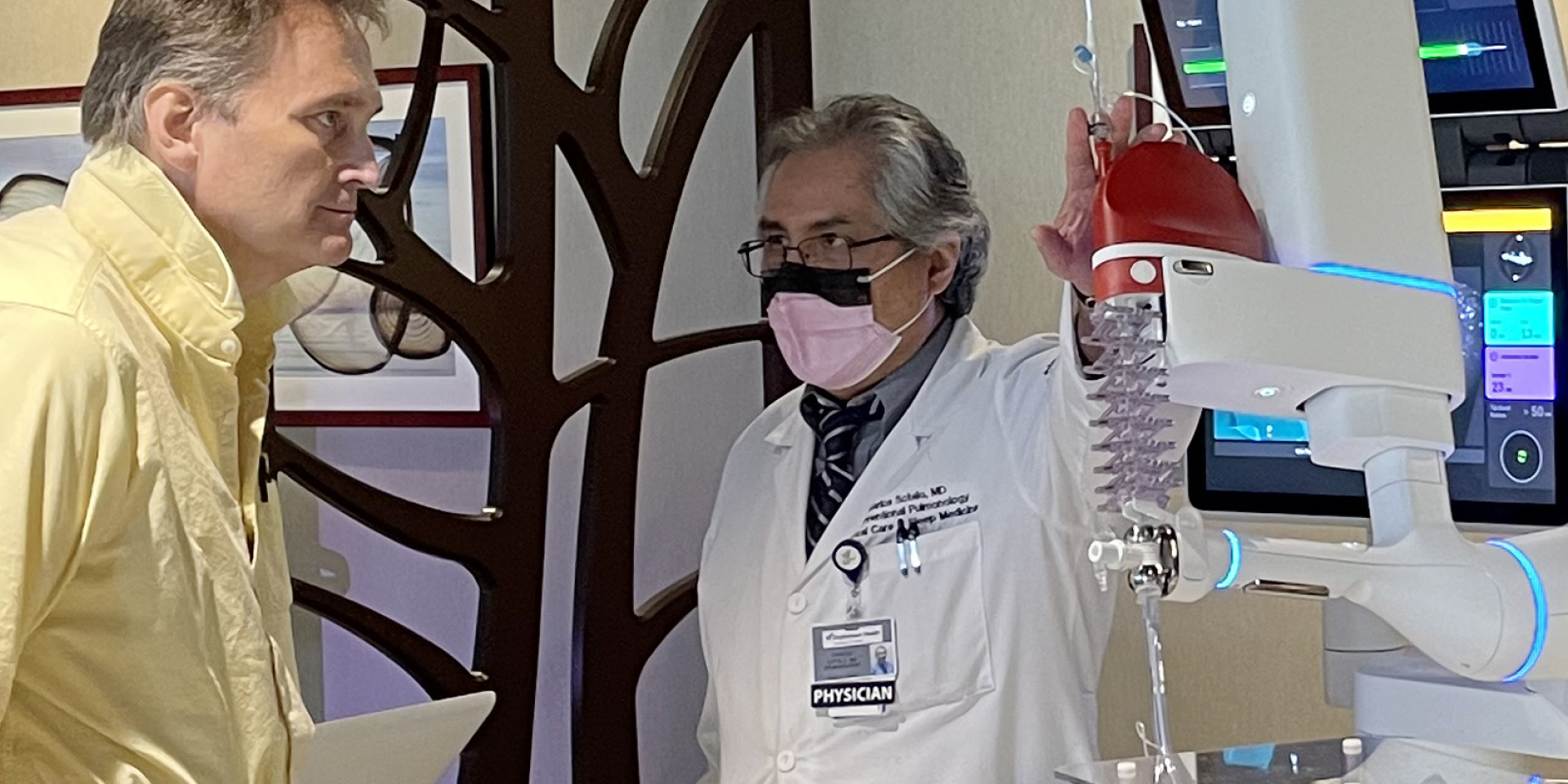Interventional Pulmonologist, Carlos Sotelo, MD, (right), discussing the benefits of Ion robotic bronchoscopy to Brad Paddock, MD (photo credit: Dawn Kelly).
Cancer treatment often can be lifesaving, but it tends to come with a downside. While chemotherapy and radiation can help stop cancer from growing and spreading, in the process, they can create other health problems, especially for your heart (known as cardiotoxicity).
The good news for patients going through cancer treatment is that Doylestown Hospital’s Cardio-Oncology program is one of only a few in the region that can help protect their heart. Our Cardio-Oncology program monitors patients’ hearts before, during, and after treatment to minimize or even prevent any potential damage.
“Cardio-Oncology is for patients who are undergoing radiation to their chest or neck or going through chemotherapy. Certain types of chemotherapy can cause heart failure and atrial fibrillation (AFib), but both types of cancer treatments have the potential to increase blood pressure,” explains Cardio-Oncology Nurse Navigator Kassie Richman, RN, who adds the program that started in 2000 is growing rapidly. “We think of all of these patients as being at risk and see Cardio-Oncology as prevention. We want to prevent complications to your heart while you’re undergoing treatment.”
How it Works
Typically, an oncologist refers patients to the Cardio-Oncology program because they’re being treated with a certain type of chemotherapy or undergoing radiation and they need to be evaluated by a cardiologist.
“Based on the full cardiology assessment and considering patient risk factors, we will determine the best course of action for treatment. Our goal is to never stop chemotherapy or radiation. We always want the patients to be treated for cancer,” Kassie says.
New technologies may be used to detect potential toxicity from cancer treatment sooner. The cardiologist or oncologist might order an “echocardiogram with strain imaging,” a newer echocardiogram technique that looks at the left ventricle (pumping chamber of the heart) in a different way, notes Kassie. This can be an early predictor of heart weakening and may lead to closer monitoring.
Cardio-Oncology and Lung Cancer
Most patients with lung cancer tend to be diagnosed after they have symptoms, which can include chronic cough, coughing up blood, shortness of breath, unexplained weight loss, respiratory infections, and chest pain, according to Carlos Sotelo, MD, interventional pulmonologist at Bucks County Medical Associates.
And because they’re experiencing symptoms, their lung cancer is typically advanced when it’s more difficult to treat. Along with surgery, treatment often includes chemotherapy and radiation. And like other cancers, these treatments can have damaging effects on a patient’s heart.
“Some patients with lung cancer are treated with radiation to the chest. And although radiation oncologists do a really good job of protecting the heart, it’s not perfect,” Kassie adds.
Advances in Lung Cancer
Dr. Sotelo explains a lung cancer diagnosis is not what it used to be. “Lung cancer is no longer a death sentence. It can be cured if diagnosed early,” says Dr. Sotelo, who uses the Ion robotic-assisted bronchoscopy procedure to find and biopsy early-stage lung cancer nodules. “These days, lung cancer can become a chronic condition even if it’s advanced because of all the medications available. It’s easier to control the disease with the treatments we currently have.”
He adds that exciting developments in lung cancer research are happening with new data showing that even patients with small, curable lung cancer receiving neoadjuvant therapy (treatments given before surgery), over time, actually do better than patients who only get the surgery.
Dr. Sotelo further explains that unlike in the past, lung cancer treatments have become more targeted and don’t affect as many organs. But even so, because of its proximity to the lungs, the heart tends to be one area that treatments can still touch, especially during radiation.
And for that reason, Cardio-Oncology can be very beneficial to these patients, he says. “One common feature we see in many of our patients is shortness of breath. We will question: Is it the heart, the lung, or the cancer medications? And then we can collaborate with our cardiology colleagues to find out what is at the root of the problem.”
- To learn more about Cardio-Oncology, visit Doylestown Health’s Cardio-Oncology program.
- To learn more about Ion robotic-assisted bronchoscopy, visit Doylestown Health’s Robotic-Assisted Bronchoscopy program.
About Doylestown Health
Doylestown Health is a comprehensive healthcare system of inpatient, outpatient, and wellness education services connected to meet the health needs of the local and regional community. The flagship of Doylestown Health is Doylestown Hospital, a not-for-profit, community teaching hospital with 245 beds and a medical staff of more than 600 providers who deliver the highest quality care in over 50 specialties. Renowned locally, regionally, and nationally, Doylestown Hospital provides superior healthcare and offers advanced surgical procedures, innovative medical treatments, and comprehensive specialty services. Serving Bucks County for over 100 years, Doylestown Hospital is proud to educate and train the next generation of physicians through its family medicine residency program. Ranked as one of the World’s Best Hospitals by Newsweek and 9th in Pennsylvania, Doylestown Hospital is distinguished in both infection prevention and patient experience. Doylestown Hospital is the only hospital in Pennsylvania to achieve 18 consecutive ‘A’ grades for patient safety from Leapfrog Hospital Safety Grade. Learn more at doylestownhealth.org.
